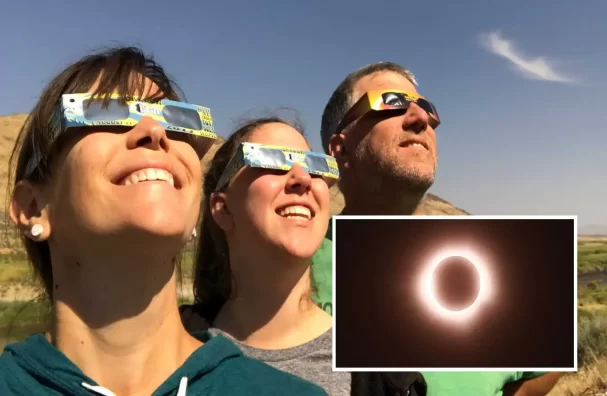
Monday’s total solar eclipse was indeed a breathtaking spectacle. However, there’s a hidden danger that could potentially harm your eyes if you observed the event without proper protection.
Solar retinopathy is a specific form of eye damage that can occur when one stares at the sun without the necessary protection. It’s caused by bright sunlight damaging the macula – the central part of the retina responsible for driving, reading, and recognizing faces.
“Even a few seconds of such viewing can temporarily or permanently burn the center of the retina,” researchers noted in a study conducted in 2017.
The severity of the damage can range from temporary to permanent central vision loss. Once the retina tissue is destroyed, it cannot regenerate, similar to brain tissue.
Despite the potential for severe damage, eye injuries from solar eclipses are relatively rare. Dr. Ralph Chou, a leading expert on safely viewing solar eclipses, reported fewer than 100 cases of eye problems related to the 2017 solar eclipse across Canada and the United States.
The American Academy of Ophthalmology (AAO) has identified several signs of solar retinopathy. These include:
- Blurry vision
- A blind spot in the central vision of one or both eyes
- Increased sensitivity to light
- Headaches
- Distorted vision, such as a straight line looking bent
- Colors looking differently than normal
Typically, visual symptoms become noticeable within four to six hours. However, some may not emerge until up to 12 hours later.
One of the most concerning aspects of solar retinopathy is that it’s not immediately noticeable.
“You don’t have nerve endings on the back of your eyeball, so you could be experiencing a burn and not know it. And that burn might turn out to be permanent,” explained Michelle Nichols, director of public observing at the Adler Planetarium to NBC Chicago on Monday.
While there’s no treatment for solar retinopathy, it’s crucial to see an ophthalmologist if you suspect you have it. They can assess the extent of the damage and monitor your recovery.
Several cases illustrate the potential risks of viewing a solar eclipse without protection. A 42-year-old man experienced blurry vision in both eyes for two months after staring directly at the sun for several minutes, according to a 2014 case study.
In another case, a woman from Brooklyn claimed to have suffered irreversible eye damage, including a blind spot in the middle of her left iris, after squinting at the 2017 eclipse for 10 seconds without protective glasses.
The prognosis for solar retinopathy varies. Many individuals recover within three to six months. However, permanent vision loss remains a possibility.
